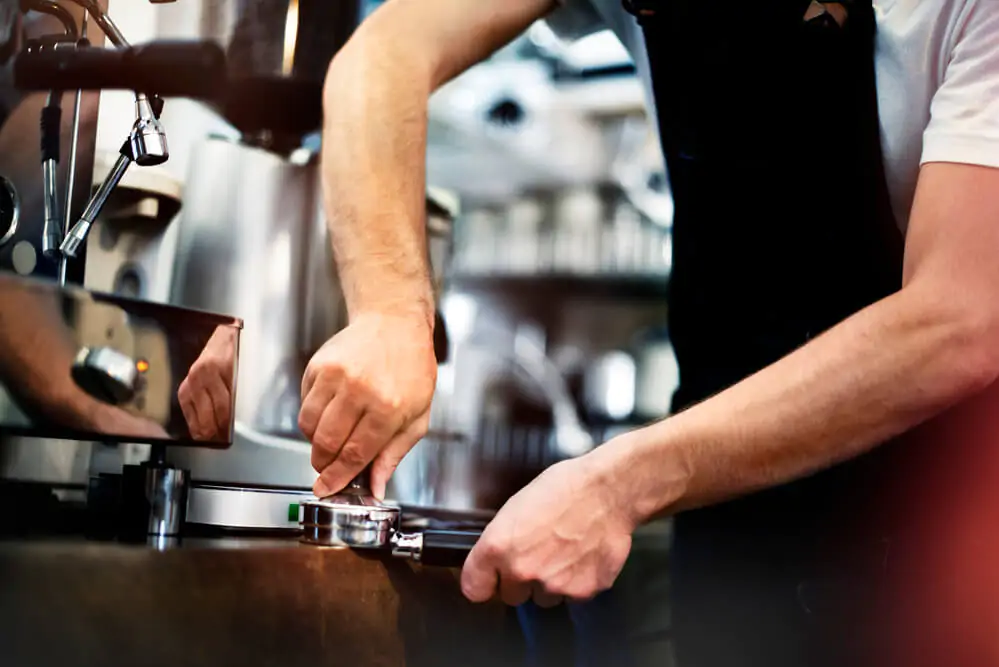You may be wondering, how long does it take to become a barista? And how long to finish its training? Well, there are several points to keep in mind.

If you are someone who loves your morning latte, macchiato, or cappuccino, you may want to spend your career around coffee beans. If that is the case, you may be looking at a coffee shop, such a Starbucks, wondering what the training program is like to earn recertification.
The coffee industry requires a wide variety of barista skills. This includes learning drink recipes, perfecting customer service skills, and master in the coffee grinder. It can take new baristas a while to master this interesting job.
How long does a training course take? Job training for new employees at a coffee shop can vary.
What Is The General Timeline To Train Experienced Baristas?
There is a difference between taking a job at a coffee job as a barista and becoming proficient in these skills. The general timeline includes:
First Week: Learn The Steps

You may think that the first step is learning how to work with a wide variety of coffee machines. This is not the case. The first thing baristas have to do is learn about the workplace. This includes lemon the location of fire exits, who to contact in the event of an emergency, and understanding how to avoid contaminating certain types of milk and coffee.
In addition, baristas also need to learn whose job it is to bus tables, how to store everything, and who to contact if there are certain products that are running low. In addition, baristas also have to memorize the cleaning and hygiene practices at the coffee shop.
Another important part of the first week is learning how to change the settings on the grinder, how to steam milk, how to control the temperature of beverages, and how to properly extract espresso.
Finally, baristas also have to learn the menu, how to describe certain items to a customer, what to do if there is a complaint, and how to handle certain allergy warnings. All of this is handled during the first week. For more, check out out guide on how to be a good barista.
First Month: Learning Basic Skills

New baristas have to gain experience behind the bar before they can handle a wide variety of orders. During the first few months, baristas should learn how to troubleshoot basic problems that could arise with the grinder, coffee makers, and espresso machines.
This may also be a good time the train baristas how to customize recipes for customers, how to perform basic latte art, and how to multitask behind the cash register. Baristas also need to spend this time mastering basic skills, including customer service. As long as new baristas have appropriate support, they should be able to master basic skills in a few months.
First Year: Becoming A Proficient Barista
After approximately three months, a barista should be expected to serve high-quality espresso, cappuccino, latte, and macchiato beverages to satisfy customers efficiently. A junior barista should be able to adjust the grinder, clean all machines adequately, steam milk appropriately, and control the extraction process.
In order for baristas to become experts, they need approximately one year of supervised training. In addition to having strong coffee knowledge and technical abilities, an experienced barista also has to have master customer service skills. They should understand the recipes of regulars, how to help newcomers order drinks appropriately, and how to talk passionately about different types of coffee.
An experienced barista should also be able to manage stock appropriately, understanding when to order more of a certain ingredient without ordering so much that it starts to go bad before it can be used.
All of this is going to be impossible without approximately one year of experience. That is why continuing education and specialized training are important for becoming a master barista.
Online Training And In-Person Training Options
There is nothing that is going to replace hands-on, in-person experience from a coffee shop; however, earning a job as a barista can be competitive. Therefore, there are lots of baristas who are looking for ways to strengthen their applications. One option is to explore online training programs as well.
For example, the World Barista Institute is a great place for all aspiring baristas to start. This program offers online courses that cover everything from basic barista skills, such as working an espresso machine, to specialized latte art. Some coffee shops and work these courses in their own training programs for part-time and full-time baristas.
There are several additional training programs that aspiring baristas may find helpful. These include:
- The Specialty Coffee Association (SCA) is a training program that has recognized professional standards and gives all graduates a diploma at the end of the program
- The Seattle Barista Academy provides hands-on training with a money-back guarantee
- Barista Hustle is a 100 percent online subscription option that provides helpful sample videos to help baristas learn online
You can tailor your barista education to meet your specific needs.
Final Word On How Long Does It Take To Become A Barista?
Online and in-person training programs vary significantly in length if you are trying to become a barista. A lot of people get barista training after they get hired by a coffee shop.
If you would like to make your application more competitive, you may want to explore additional online or in-person training programs. In order to become a successful barista, you have to communicate effectively, multitask well, and have a strong passion for coffee.
FAQs About How Long Does It Take To Become A Barista?
What is the average wage for a barista?
The average wage for a barista can vary significantly depending on experience and location. Some baristas get paid more than $20 per hour.
What is the most important skill to learn to be a barista?
The most important thing you have to learn to be a barista is how to communicate effectively with your customers and team members.
